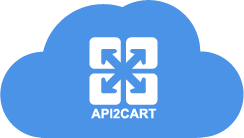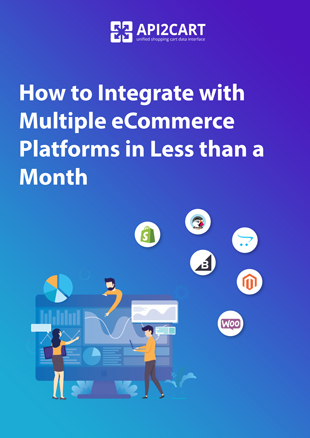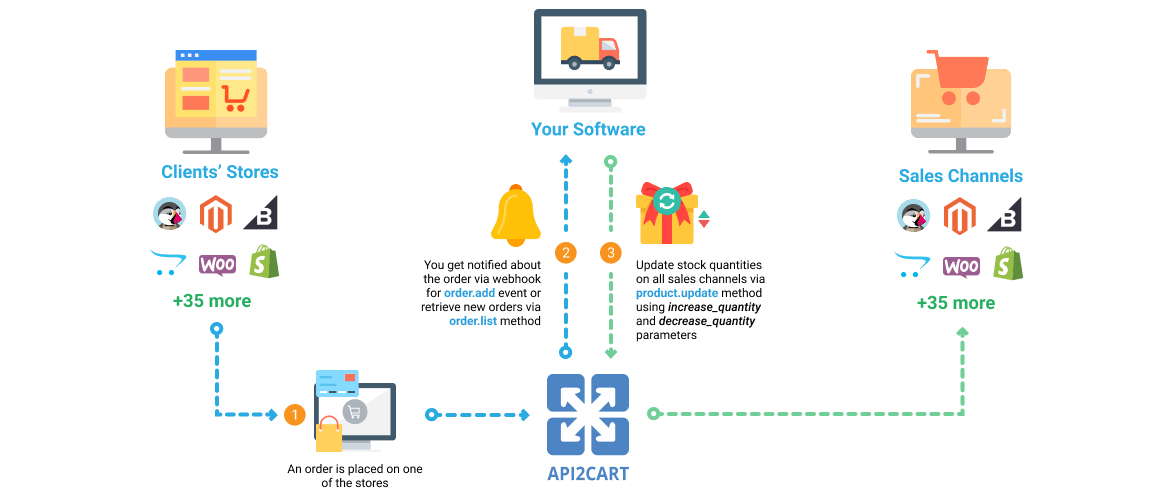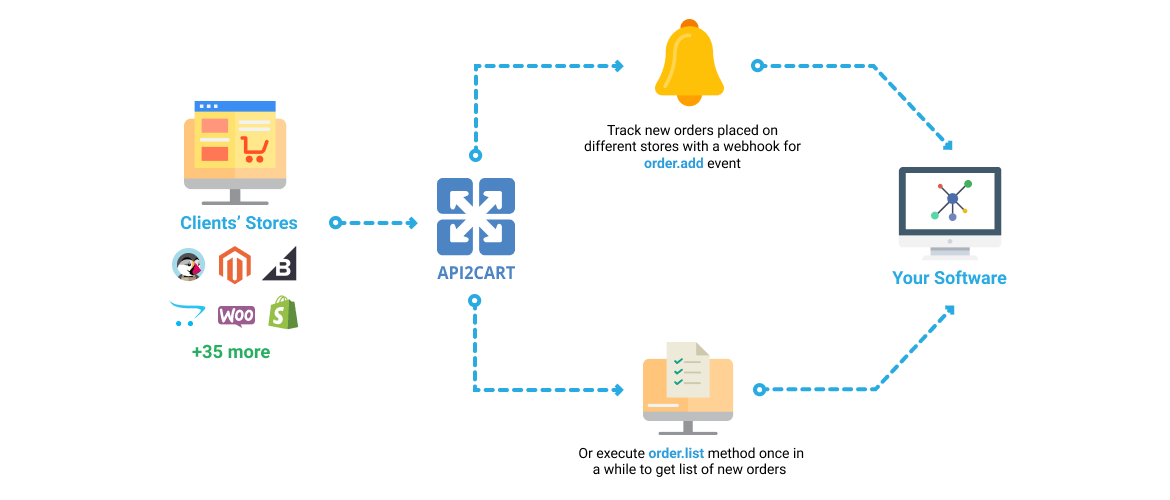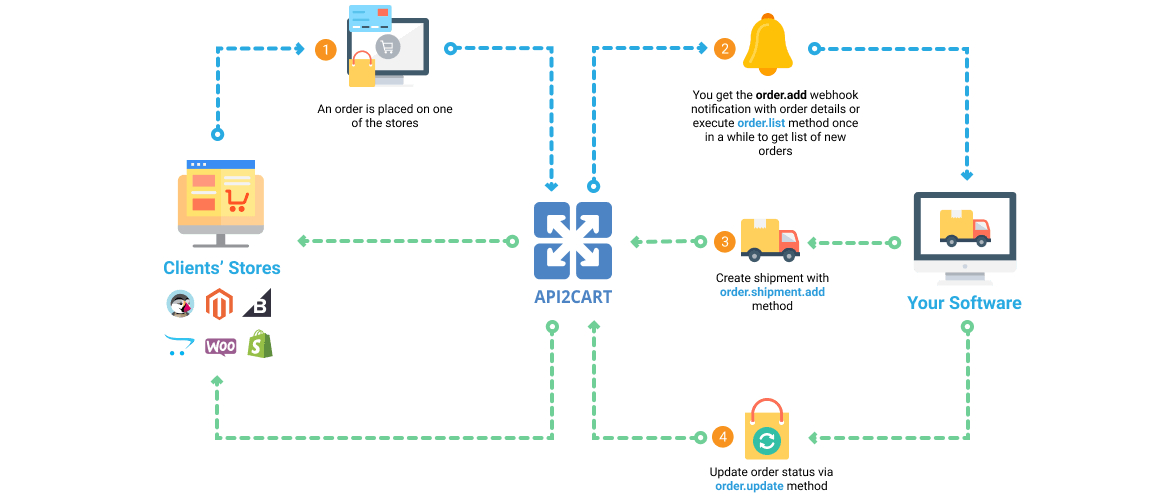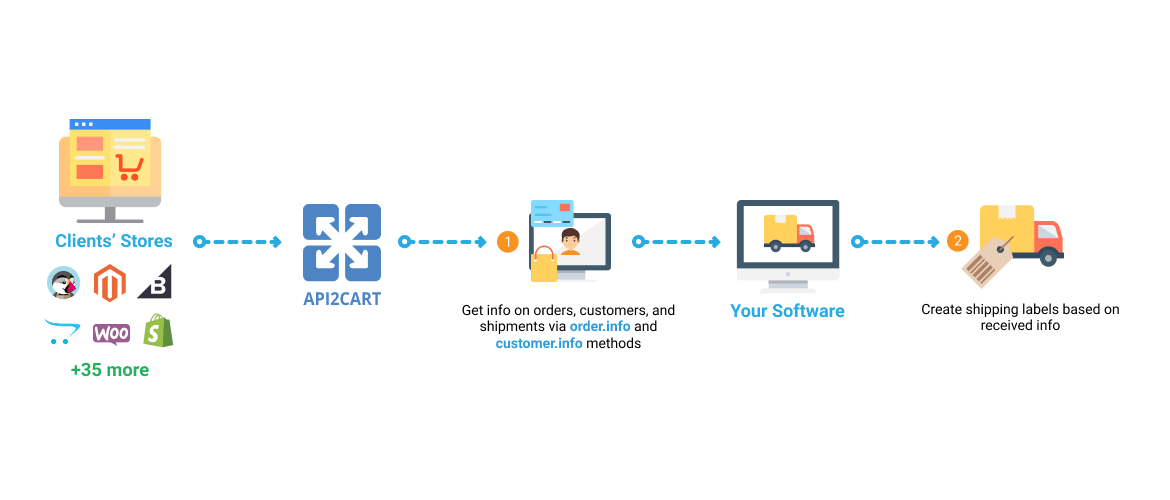WooCommerce Shipping Integration Workflow
How to Get Started with WooCommerce Shipping Integration via API2Cart
- Register API2Cart account with the help of our specialists by booking a free demo call to start with WooCommerce shipping integration development
- Add your customers’ stores built on WooCommerce platforms
- Work with WooCommerce store data such as orders, products, categories, shipments, customers, etc
List of methods for WooCommerce Shipping Integration
Webhook
-
webhook.create
Create webhook on the store and subscribe to it. -
webhook.list
List registered webhook on the store. -
webhook.count
Count registered webhooks on the store. -
webhook.events
List all Webhooks that are available on this store. -
webhook.delete
Delete registered webhook on the store. -
webhook.update
Update Webhooks parameters.
Cart
-
cart.create
Add store to the account -
cart.validate
Check store availability, bridge connection for the downloadable carts, identify DB prefix, validate API accesses for API carts. -
cart.list
Get list of supported carts -
cart.bridge
Get bridge key and store key -
cart.delete
Remove store from API2Cart -
cart.disconnect
Disconnect with the store and clear store session data. -
cart.methods
Get list of cart methods -
cart.config
Get list of cart configs -
cart.config.update
Use this API method to update custom data in client database. -
cart.coupon.count
Get cart coupons count. -
cart.coupon.list
Get cart coupon discounts. -
cart.giftcard.count
Get gift cards count. -
cart.giftcard.list
Get gift cards list. -
cart.giftcard.add
Create new gift card -
cart.coupon.add
Create new coupon -
cart.coupon.condition.add
Create new coupon condition -
cart.coupon.delete
Delete coupon -
cart.catalog_price_rules.count
Get count of cart catalog price rules discounts. -
cart.catalog_price_rules.list
Get cart catalog price rules discounts. -
cart.script.list
Get scripts installed to the storefront -
cart.script.add
Add new script to the storefront -
cart.script.delete
Remove script from the storefront -
cart.info
Get cart information -
cart.clear_cache
Clear cache on store. -
cart.plugin.list
Get list of installed plugins -
cart.shipping_zones.list
Get list of shipping zones -
cart.meta_data.list
Get entity meta data -
cart.meta_data.set
Set meta data for a specific entity -
cart.meta_data.unset
Unset meta data for a specific entity -
bridge.download
Download bridge for store
Account
-
account.cart.list
Get list of carts. -
account.cart.add
Add store to the account -
account.config.update
Update configs in the API2Cart database. -
account.failed_webhooks
List webhooks that was not delivered to the callback. -
account.supported_platforms
Get list of supported platforms
Bridge
-
bridge.update
Update bridge in the store. -
bridge.delete
Delete bridge from the store.
Product
-
product.list
Get list of products from your store. Returns 10 products by default. -
product.count
Count products in store. -
product.info
Get product info about product ID *** or specify other product ID. -
product.find
Search product in store catalog. "Apple" is specified here by default. -
product.fields
Retrieve all available fields for product item in store. -
product.add
Add new product to store. -
product.update
Update price and quantity for a specific product -
product.delete
Product delete -
product.price.add
Add some prices to the product. -
product.price.update
Update some prices of the product. -
product.price.delete
Delete some prices of the product -
product.image.add
Add image to product -
product.image.update
Update details of image -
product.image.delete
Delete image -
product.variant.image.add
Add image to product -
product.variant.image.delete
Delete image to product -
product.attribute.list
Get list of attributes and values. -
product.attribute.value.set
Set attribute value to product. -
product.attribute.value.unset
Removes attribute value for a product. -
product.option.add
Add product option from store. -
product.option.list
Get list of options. -
product.option.assign
Assign option from product. -
product.option.value.add
Add product option item from option. -
product.option.value.assign
Assign product option item from product. -
product.option.value.update
Update product option item from option. -
product.review.list
Get reviews of a specific product. -
product.variant.add
Add variant to product. -
product.child_item.info
Get child for specific product. -
product.child_item.list
Get child items list of specific product(s). -
product.child_item.find
Search product child item (bundled item or configurable product variant) in store catalog. -
product.variant.list
Get list variants. -
product.variant.info
Get variant info. -
product.variant.count
Get count variants. -
product.variant.update
Update variant. -
product.variant.delete
Delete variant. -
product.variant.price.add
Add some prices to the product variant. -
product.variant.price.update
Update some prices of the product variant. -
product.variant.price.delete
Delete some prices of the product variant. -
product.tax.add
Add tax class and tax rate to store and assign to product. -
product.manufacturer.add
Add manufacturer to store and assign to product -
product.brand.list
Get list of brands from your store. -
product.currency.add
Add currency and/or set default in store -
product.currency.list
Get list of currencies -
product.store.assign
Assign product to store
Category
-
category.list
Get list of categories from store. -
category.count
Count categories in store. -
category.info
Get category info about category ID*** or specify other category ID. -
category.find
Search category in store. "Laptop" is specified here by default. -
category.add
Add new category in store -
category.update
Update category in store -
category.delete
Delete category in store -
category.assign
Assign category to product -
category.unassign
Unassign category to product -
category.image.add
Add image to category -
category.image.delete
Delete image
Order
-
order.count
Count orders in store -
order.list
Get list of orders from store. -
order.info
Info about a specific order by ID -
order.find
This method is deprecated and won't be supported in the future. Please use "order.list" instead. -
order.add
Add a new order to the cart. -
order.update
Update existing order. -
order.status.list
Retrieve list of statuses -
order.financial_status.list
Retrieve list of financial statuses -
order.fulfillment_status.list
Retrieve list of fulfillment statuses -
order.abandoned.list
Get list of orders that were left by customers before completing the order. -
order.shipment.list
Get list of shipments by orders. -
order.shipment.info
Get information of shipment. -
order.shipment.add
Add a shipment to the order. -
order.shipment.update
Update order's shipment information. -
order.shipment.delete
Delete order's shipment. -
order.shipment.tracking.add
Add order shipment's tracking info. -
order.refund.add
Add a refund to the order. -
order.transaction.list
Retrieve list of order transaction -
order.preestimate_shipping.list
Retrieve list of order preestimated shipping methods
Basket
-
basket.live_shipping_service.list
Retrieve a list of live shipping rate services. (Beta) -
basket.info
Retrieve basket information. -
basket.live_shipping_service.create
Create live shipping rate service. (Beta) -
basket.live_shipping_service.delete
Delete live shipping rate service. (Beta) -
basket.item.add
Add item to basket
Customer
-
customer.list
Get list of customers from store. -
customer.count
Get number of customers from store. -
customer.info
Get customers' details from store. -
customer.find
Find customers in store. -
customer.add
Add customer into store. -
customer.update
Update information of customer in store. -
customer.group.list
Get list of customers groups. -
customer.group.add
Create customer group. -
customer.attribute.list
Get attributes for specific customer
Attribute
-
attribute.list
Get attributes list -
attribute.info
Get attribute info -
attribute.count
Get attributes count -
attribute.type.list
Get list of supported attributes types -
attribute.delete
Delete attribute from store -
attribute.add
Add new attribute -
attribute.update
Update attribute data -
attribute.assign.group
Assign attribute to the group -
attribute.assign.set
Assign attribute to the attribute set -
attribute.unassign.group
Unassign attribute from group -
attribute.unassign.set
Unassign attribute from attribute set -
attribute.group.list
Get attribute group list -
attribute.attributeset.list
Get attribute_set list
Tax
-
tax.class.info
Get info about tax
Subscriber
-
subscriber.list
Get subscribers list
Unified API by API2Cart Allows You
Time
Money
Human resources
What our customers say

So we have a proprietary POS system called Rain Retail. rainpos.com has more info if you want to see how it works, but your platform is allowing us to integrate with Shopify so our clients who already sell on that platform can centralize inventory management in our system. We LOVE you guys, thanks for everything your support team has been doing for us!!!

We use Api2Cart for our customer integrations and have found them to be very helpful and responsive to any issues we have faced. Integration across so many variants and versions of shopping carts gets complicated very quickly and their expertise has helped us smooth over this process. I would recommend them to anyone looking to simplify their integrations.

Consistently Amazing - …the API and the infrastructure we use for shopping carts is built by a solid software engineering team we've known for years. Salesorder.com is a mission-critical order management platform for wholesalers. Our due diligence selected API2Cart as the best in its class. They’ve connected over 50 carts. It’s how they earn their living, and they’re probably best there is on Earth at cart integration and supporting a critical part of your business.

I have been using API2Cart since beginning of 2014 for our new webstores product. We have successfully integrated close to 100 stores and are currently doing 5 new stores every week. We started with the standard plan (shared hosting) and in 2015 we upgraded to a dedicated server to increase the number of monthly and concurrent API requests. As an ecommerce company with more than 20,000 online sellers security is very important for us. During the time that we have used API2Cart we have not had any problems related to security. The support that API2Cart provide us with is excellent. Communication is quick and the expertise from their engineers have helped us to successfully integrate API2Cart with our own platform.

We use API2CART now for more then a year. Several customers of our application are succesfully connected to this platform. So far we are very happy with the product and the service as well! Keep up the good work!

We have been working with you now for nearly 2 years now and your support is fantastic, one of the best I have worked with plus we have never had any security issues with you.

An API connection to shopping carts is the best way to work with merchants. Managing all those connections is a lot of work and requires a lot of knowledge. By using API2Cart we don't need to spend the time and effort to create and maintain all these connections.

Cooperation with API2Cart is a great opportunity for UniSender to become more accessible for e-commerce platforms users. For us it’s fast and profitable since API2Cart supports integration with dozens of shopping carts thus providing secure and reliable integration. For our users it’s even more opportunities to quickly and securely transfer their client’s contact information from the most popular platforms into UniSender and start an e-mail marketing campaign immediately.

Thank you, API2Cart. Your API has helped us integrate with a new platform. You are a big part of our success.

So far API2Cart has been great! Simple and functional. I really liked the collector class from the code sample. It’s so easy to call the functions I want through that.

At AppsBuilder we have been using API2Cart for over a year and so far over 100 of our clients have successfully used it to connect to the eCommerce provider of their choice. We have found the security of API2Cart to be excellent, and are confident that our clients' data and that of their customers in turn is more than adequately protected. We have certainly not encountered any problems of a security nature and nor do we expect to.

API2Cart enables us to support synchronization to any of the e-Commerce carts that our customers use. This means we can focus on what we do best, enabling turnkey mobile commerce applications.

We are delighted to be working with API2Cart and be able to offer our mCommerce solution to hundreds of thousands of eCommerce store owners looking to go mobile. Being invited as part of the API2Cart network means any eCommerce store owner can easily synchronise their store with MobiCart.

We have finally succeeded in getting our first client adding the store to API2Cart. And the API worked! Pure magic. I simply press the button and receive all the necessary information. This thing is really awesome.

